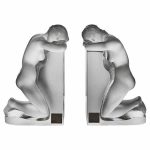Dear Lee,
Ever try to explain why you collect to a non-collector? Don’t try. Non-collectors never understand unless you fib a little and say you are buying everything as an investment. But psychologists have come to our rescue. The latest theory is that shopping is an instinct, similar to a squirrel’s need to forage for nuts. It really is in the genes. For humans, the desire is to have not just the object, but also what it represents: luxury, status, excitement, being clever enough to get a bargain. Shopping can reduce stress, build self esteem and give us the illusion of control over our lives. What a relief to know that rummaging through shops and house sales is actually improving our mental health.
Of course, the collecting world can be a little strange. A 10-year-old grilled cheese sandwich with the image of the Virgin Mary on it sold online for $22,000. A ghost and his cane sold for $65,000 online in December. Be assured-the new owner is not a true collector. Both were bought by Goldenpalace.com, an online casino that no doubt wanted the publicity more than the objects.
Meanwhile, the collectors and dealers who read our newsletter enjoy life even when they’re not shopping. After laughing over our October Letter to Lee, which listed some funny questions we’ve been asked, a Washington State dealer wrote to tell us her favorite story: “A couple brought in a 1920s bridge lamp to learn the value. The woman said it was worth a lot because it was made by a very famous man named Art Noovoo. ‘That’s not a person,’ I told her. ‘That’s a style-Art Nouveau.'” It’s easy to misinterpret unfamiliar names and terms. A Florida couple wrote asking us about a chair they owned that had been amateurishly refinished and reupholstered: “It was done before we bought it. I am no restorer, but I watch the Antiques Roadshow and understand about pâté Nina.” It took a minute to realize she did not mean a food like liver pâté, but rather the wood’s patina or surface sheen produced by age and wear.




Leave a Reply
You must be logged in to post a comment.